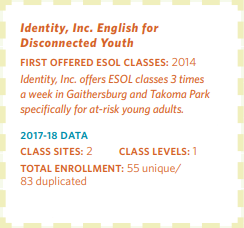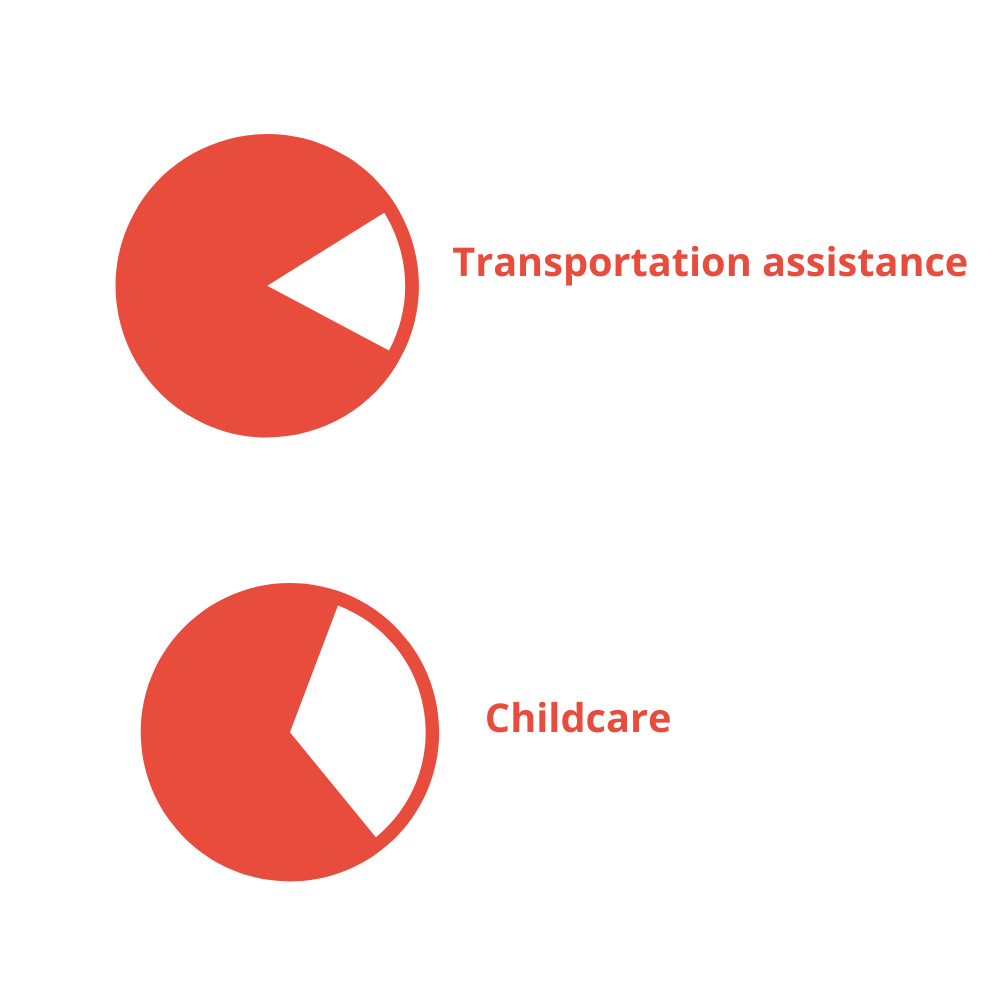-
Program
Administrator
ToolkitA Guide to Implementing and Managing Community-Based Adult ESOL Classes and Programs
-
You are here
Chapter 17: Support Services
Retaining Students- Chapter 17
Support Services
♦ PRACTICE EXAMPLE
Seneca Creek Community Church
Yvonne Ellis, ESOL Program ManagerESOL Program
FIRST OFFERED ESOL INSTRUCTION: 2011
Seneca Creek Community Church holds year-round classes on Saturday mornings in Gaithersburg.
2017–18 DATA
CLASS SITES: 1 CLASS LEVELS: 7 TOTAL ENROLLMENT: 155 unique/313 duplicated“The mission of Seneca Creek Community Church’s (SCCC’s) ESOL Program is to provide opportunities for all individuals in the community to succeed through improved English language skills, assist participants to build confidence and participation in their community, and increase the social and financial well-being of adult ESOL learners and their families.
SCCC takes a holistic family approach to its ESOL Program; it runs a Child Enrichment Program that provides free childcare and tutoring for children while their parents are in class.
It partners with the Montgomery County Public Schools to offer free lunches to the children, and established a tutoring program with the assistance of a nonprofit agency. In addition, the SCCC ESOL Program makes referrals to Worksource Montgomery and Gilchrist Immigrant Resource Center to utilize available resources for job search and readiness, citizenship classes, and basic computer classes. It also connects learners to the Neighbors 4 Neighbors Network (a forum affiliated with the church at which community members can discuss needs and learn about various community resources), and other nonprofit agencies to address other non-ESOL identified needs.”
♦ NOTES FROM THE FIELD
 Ana Dudamel, Former Program Manager, discusses how Identity’s ESOL classes fit in with the other support services it provides to disconnected youth (aged 15-25) to help them reach their educational, work, and life goals:
Ana Dudamel, Former Program Manager, discusses how Identity’s ESOL classes fit in with the other support services it provides to disconnected youth (aged 15-25) to help them reach their educational, work, and life goals:“We reach at-risk youth facing significant challenges related to poverty, immigration status, trauma, substance abuse, and/or mental health issues. Lack of English language skills is an additional obstacle in connecting to school, employment, and community supports. Identity’s two Youth Opportunity Centers (YOCs) provide workforce development and educational counseling; mental health services; and referrals to county safetynet services such as food, clothing, health services, and legal services. Each learner is assigned a Case Manager and, when needed, a Workforce Development Specialist who assess client needs through intake surveys and work with them to create individual education and employment plans. Case managers check in with learners twice a month, tracking progress and encouraging participation in ESOL and other YOC programs. Students receive through their Case Managers, such as mental health and substance abuse counseling at Identity.
Lack of English skills is an obstacle in connecting to school, employment, and community supports
Our ESOL classes maximize learners’ opportunity to experience success, thereby building learners’ positive associations with learning English. And, the English communication skills they gain will motivate them to continue their education at the YOCs, which are focused on advancing educational attainment and employability of disconnected youth. YOC workforce development services help youth realize meaningful gains in workforce development competencies such as communication skills, conflict resolution skills, financial literacy, computer literacy, and executive functioning. ln FY19, ESOL students will participate in the YOCs’ lnternship Program, whereby two students from the program will be offered a four-to six-week paid internship at Identity. Basic literacy gains in English provide youth with a foundation for participation in these programs, YOC GED instruction and applied academics, and other community ESOL classes.”
Retaining Students - MCAEL Data

As part of its mission to increase adult access to English instruction, MCAEL grant funding can be used by adult ESOL providers to provide childcare and transportation support. Five out of 25 2018-19 grant recipients provide transportation assistance, 11 out of the 25 offer childcare. Grant recipients provide assistance to learners.

